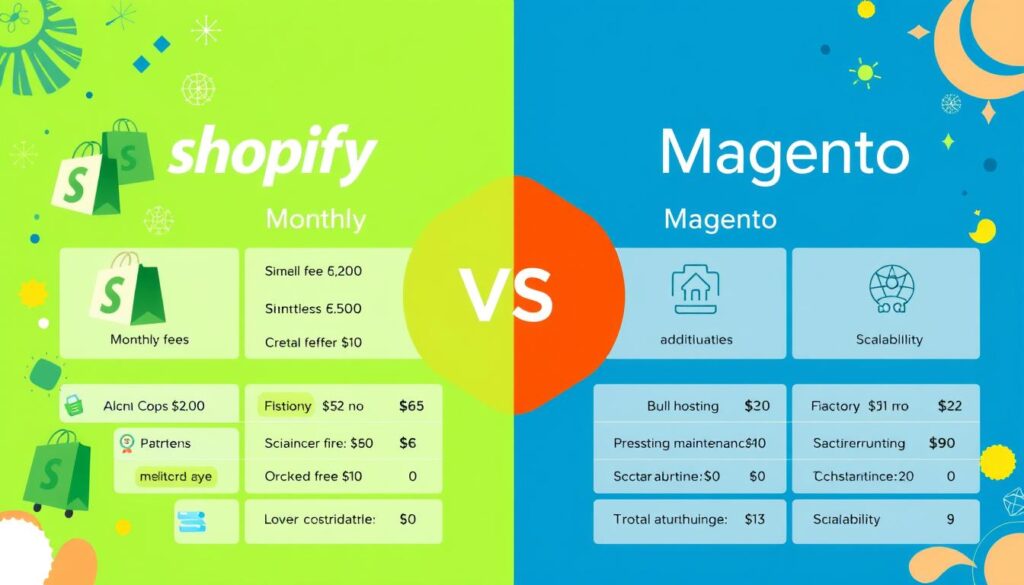Shopify vs. Magento: The Ultimate Choice for Your E-commerce Website

Table of Content
I remember when my small online boutique felt trapped by its digital limits. Every Australian entrepreneur knows that picking the right e-commerce platform is key. It’s not just a technical choice; it’s a business strategy that can make or break your success online.
Looking into Shopify and Magento, we found a world of chances to grow our digital space. Our search showed two big players, each with special strengths for Aussie businesses wanting a strong online store.
This detailed comparison will help you understand the world of e-commerce. We’ll look at the differences between Shopify and Magento. We’ll talk about the features, flexibility, and growth possibilities that can take your online business to the next level.
Key Takeaways
- Understand the unique advantages of Shopify web development
- Explore Magento ecommerce platform’s extensive capabilities
- Evaluate platforms based on business size and growth prospects
- Consider customisation and scalability needs
- Assess total cost of ownership beyond initial setup
Understanding E-commerce Platform Fundamentals
Choosing the right e-commerce platform is key to your online success. Today, picking between Shopify and Magento needs careful thought. You must consider many important factors.
Digital entrepreneurs need strong solutions for their online stores. We’ll look at the essential elements that turn a simple website into a powerful sales tool.
Key Features of Modern E-commerce Solutions
Online stores need advanced features to succeed. The best platform should have:
- Easy product management systems
- Smooth payment gateway integration
- Advanced inventory tracking
- Designs that work well on mobiles
- Comprehensive analytics tools
Essential Components for Online Store Success
Building a successful online store is more than just basic features. Choosing the right platform is critical for your digital success.
“Your e-commerce platform is the foundation of your digital business strategy.” – Digital Retail Experts
Platform Scalability and Growth
When looking at Shopify or Magento, think about your future growth. Your platform must grow with your business, handling more customers, products, and sales.
- Support for growing product ranges
- Ability to handle more website visitors
- Flexibility for complex business models
- Integration with third-party apps
Grasping these basics will help you make a smart choice. This choice will drive your online business forward.
Shopify Web Development: A Complete Overview
Shopify web development has changed online shopping for Australian businesses. It offers a strong platform that makes digital retail easier. We’ll see why it’s a top choice in the e-commerce world.
Shopify’s main strength is its powerful development tools. Sydney businesses looking for advanced Shopify web design can use many features. These features make setting up an online store easy:
- Intuitive drag-and-drop interface
- Extensive theme customisation options
- Integrated payment gateways
- Mobile-responsive designs
“Shopify web design sydney transforms complex web development into an accessible journey for entrepreneurs.” – Digital Retail Experts
Our approach to Shopify web development is about making online stores scalable and easy to use. Sydney businesses get many benefits, including:
- Professional theme selections
- Seamless app integrations
- Advanced analytics tools
- Secure hosting environments
Struggling with Shopify customisation? Contact expert developers at hello@defyn.com.au for help. They’ll tailor their advice to your business needs.
Magento Ecommerce Platform: Features and Capabilities
The Magento ecommerce platform is a strong choice for businesses wanting a solid online store. It lets merchants build flexible, growing stores that meet their needs.
Open Source vs Enterprise Edition
Magento has two main versions for different business sizes:
- Open Source (Community) Edition: Great for small to medium businesses
- Enterprise Edition: For big businesses with extra features
Advanced B2B Capabilities
Our Magento web design team highlights its top B2B features. These include:
- Custom price lists
- Negotiated quotes
- Company account management
- Bulk ordering options
Custom Development Options
Magento is great for making your store unique. Developers can add new features through:
- Custom module development
- Third-party integrations
- Personalised theme creation
“Magento provides unparalleled flexibility for businesses seeking a truly unique online presence.” – E-commerce Experts Australia
Choosing the right Magento edition depends on your business needs, growth plans, and budget.
Pricing Structures and Total Cost of Ownership
Choosing an ecommerce platform is a big financial decision for Australian businesses. The shopify ecommerce platform and magento ecommerce website have different pricing models. These can greatly affect your online store’s budget.

- Basic Shopify: Great for new online stores
- Shopify: Ideal for growing businesses
- Advanced Shopify: For large, scaling enterprises
Magento’s pricing is more complex, with two main editions:
- Magento Open Source: Free but needs a lot of development costs
- Magento Commerce: A top-level solution with lots of features
| Platform | Monthly Cost | Transaction Fees | Additional Development Costs |
|---|---|---|---|
| Shopify | $29 – $299 | 0.5% – 2% | Low to Moderate |
| Magento | $0 – $2,000 | No direct fees | High |
“The right platform isn’t just about price, but value for your specific business needs.” – Australian E-commerce Expert
It’s important to look at more than just the initial cost. Think about hosting, extensions, theme development, and ongoing maintenance. These factors are key when deciding.
Design Flexibility and Theme Customisation
Choosing the right e-commerce platform is key. Australian online stores need solutions that look good and work well. They must be flexible for their digital shops.
Design is vital for a great online shopping experience. We’ve looked at how Shopify and Magento handle visual branding differently.
Shopify Custom Theme Development Process
Shopify makes theme customisation easy with several benefits:
- Intuitive drag-and-drop theme editor
- Extensive theme store with 100+ pre-designed templates
- CSS and Liquid template language for advanced customisation
Magento Web Design Options
Magento offers complex but powerful design options:
- Open-source framework for complete design control
- Advanced template hierarchy
- Robust XML layout management
Mobile Responsiveness Comparison
| Platform | Mobile Optimisation | Responsive Design |
|---|---|---|
| Shopify | Automatic mobile responsiveness | Built-in mobile-friendly themes |
| Magento | Customisable mobile experiences | Requires manual responsive configuration |
“Design is not just what it looks like and feels like. Design is how it works.” – Steve Jobs
Our study reveals Shopify is easier for custom theme development. But Magento is better for tech-savvy developers who want full design control.
Performance and Hosting Requirements
Choosing the right e-commerce platform is key. It’s about understanding performance and hosting needs. Shopify and Magento take different approaches to website infrastructure. This can greatly affect your online store’s success.

Shopify uses cloud-based hosting that makes server management easy for Aussie businesses. It handles:
- Server maintenance
- Security updates
- Performance optimisation
- Scalable infrastructure
Magento gives businesses more hosting choices. You can pick from:
- Self-hosted solutions
- Managed hosting services
- Cloud-based deployments
- Dedicated server configurations
“Performance isn’t just about speed—it’s about creating seamless customer experiences.” – E-commerce Expert
| Platform | Page Load Speed | Traffic Handling | Scalability |
|---|---|---|---|
| Shopify | Fast (under 2s) | Excellent | High |
| Magento | Variable (1.5-3s) | Configurable | Very High |
Shopify is known for its easy setup and fast performance. Magento, on the other hand, offers more customisation for complex needs. Australian online stores need to think about their specific needs when choosing between these platforms.
Security Features and Payment Gateway Integration
Setting up an online store means security is key. We’ve looked into Shopify and Magento to see how they protect your site and customer data.
SSL Certificates and Data Protection
Strong security starts with good protection. Both Shopify and Magento offer top-notch security:
- Free SSL certificates for all online stores
- Encrypted data transmission
- Regular security updates
- Advanced threat monitoring systems
Available Payment Solutions
Finding the right payment gateway is vital for Aussie businesses. We’ve compared the options:
| Platform | Payment Gateways | Transaction Fees |
|---|---|---|
| Shopify | PayPal, Stripe, AfterPay | 1.1% – 2.2% |
| Magento | WorldPay, Square, Braintree | 0.9% – 2.5% |
PCI Compliance Standards
Meeting rules is a must for online shops. Both Shopify ecommerce platform and Magento ecommerce platforms provide robust PCI DSS compliance frameworks, keeping your customers’ financial info safe.
“Security isn’t expensive, it’s priceless” – Unknown Cybersecurity Expert
By focusing on security, these platforms help Aussie businesses build trust and protect their online world.
SEO and Marketing Capabilities
Choosing the right e-commerce platform is key for your online business. Shopify web design in Sydney and the Magento ecommerce platform have their strengths. They help businesses get more online visibility.
Shopify has easy-to-use SEO tools for small to medium businesses. It includes:
- Automatic sitemap generation
- Customisable meta tags
- Clean URL structures
- Mobile-responsive design
Magento offers more advanced SEO options. Its key features are:
- Advanced URL rewrites
- Multi-store SEO management
- Detailed canonical tag controls
- Rich snippet support
“Effective SEO isn’t just about keywords, it’s about creating a seamless user experience.” – Digital Marketing Expert
In Sydney, local SEO is very important. Shopify is great for small retailers to target locally. Magento is better for big businesses with complex marketing plans.
| Feature | Shopify | Magento |
|---|---|---|
| Meta Tag Customisation | Basic | Advanced |
| URL Structure | Clean, Simple | Highly Customisable |
| Marketing Integrations | Built-in Tools | Extensive Extensions |
Your choice depends on your marketing needs and technical skills. Both platforms are strong for boosting online presence and engaging customers.
Support and Community Resources
Choosing the right e-commerce platform is key to your online success. Shopify and Magento offer strong support systems for Australian businesses. They provide the help you need to grow your online store.
Developer Networks
A good developer network is vital for custom solutions. Shopify and Magento have large groups of skilled developers:
- Shopify has a certified partner program with top developers
- Magento has a big global developer community
- Both host regular events for developers
Documentation Quality
Good documentation is essential for easy development. Here’s what we found:
- Shopify guides are easy to start with
- Magento’s technical guides are detailed
- Both have up-to-date knowledge bases
Customer Service Comparison
Customer support is a big deal for businesses. Shopify offers 24/7 live chat and email. Magento provides top-level support for its paid plans.
Choosing the right platform means finding a balance between technical support and community resources.
Australian e-commerce entrepreneurs should think about these support systems. Make sure the platform fits your business needs and skills.
Integration Possibilities and App Ecosystems
Choosing the right ecommerce platform is key. Shopify and Magento have strong app ecosystems. They help Australian online businesses grow.
Shopify’s app store makes it easy for merchants to find solutions. Entrepreneurs can boost their website with:
- Marketing automation tools
- Inventory management systems
- Customer support applications
- Shipping and logistics integrations
Magento stands out with more complex options. Its open-source architecture lets businesses customise deeply. This way, they can create unique digital experiences.
“The right integration can transform an ordinary online store into an extraordinary digital marketplace.” – E-commerce Expert
Australian businesses should think about a few things when looking at integration:
- Ease of implementation
- Compatibility with existing systems
- Scalability of integrations
- Performance impact
Both platforms offer strong solutions. But, the best choice depends on your business needs and technical skills.
Conclusion
Choosing between Shopify web development and Magento ecommerce platform is a big decision. You need to think about what your business needs. Each platform has its own strengths that fit different online retail strategies in Australia.
Shopify is great for small to medium enterprises. It’s easy to use and set up. This makes it perfect for businesses that want to start fast without needing a lot of technical knowledge. Small online shops in Australia will find it very helpful.
But, if you’re a bigger business with complex needs, Magento might be better. It offers lots of customisation options and advanced features. Businesses with their own tech teams or access to resources can really use Magento’s flexibility.
Before you decide, think about your current needs, future plans, budget, and technical skills. Getting professional advice can help Australian businesses choose the right e-commerce solution. This ensures they meet their specific needs.










